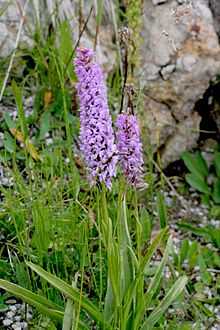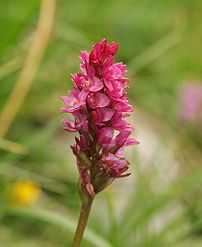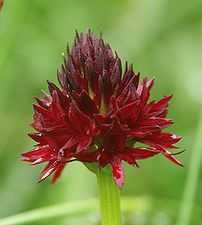Gymnadenia
| Gymnadenia | |
|---|---|
 | |
| Fragrant Orchid Gymnadenia conopsea | |
| Scientific classification | |
| Kingdom: | Plantae |
| (unranked): | Angiosperms |
| (unranked): | Monocots |
| Order: | Asparagales |
| Family: | Orchidaceae |
| Subfamily: | Orchidoideae |
| Tribe: | Orchideae |
| Subtribe: | Orchidinae |
| Genus: | Gymnadenia R.Br. |
| Synonyms[1] | |
|
Nigritella Rich. | |
Gymnadenia is a genus in the orchid family (Orchidaceae) containing 22 terrestrial species.
They can be found in damp meadows, fens and marshes, and on chalk or limestone, often in alpine regions of Europe and Asia from Portugal to Kamchatka, including China, Japan, Mongolia, Siberia, the Himalayas, Iran, Ukraine, Germany, Scandinavia, Great Britain, etc.[1][2][3] The Fragrant Orchid (Gymnadenia conopsea) has been introduced into the USA and is reportedly naturalized in Connecticut.[4]
These hardy terrestrial orchids are deciduous. They survive the winter through their corms, two deep-cut tubers (more like tuberous roots). Long lanceolate green leaves grow at the bottom of the stem. There are some small leaves at the stop of the stem.
They flower during the summer. The inflorescence is a dense cylindrical spike between 5 and 30 cm long. It can consists of up to 150 small pleasant-smelling flowers. It is recently discovered that eugenol and isoeugenol, floral volatile scent compounds, are catalyzed by single type of enzyme in Gymnadenia species and gene encoding for this enzyme is first functionally characterized gene in this species so far.[5] Their color can vary from pale purple to pink and white. The lip is wide with three lobes. The marginal petals are horizontal. There is a long, thin, threadlike spur.
Several species were formerly classified under Nigritella. The nothogeneric name ×Gymnigritella was used for hybrids between these two groups.
Species
- Gymnadenia archiducis-joannis[6] (Austria)
- Gymnadenia austriaca[6] (C. Europe to Pyrenees).
- Gymnadenia bicornis (Tibet)
- Gymnadenia borealis (N. & C. Europe)
- Gymnadenia × breinerorum[6] (G. cenisia × G. corneliana) (France)
- Gymnadenia buschmanniae[6] (Italy)
- Gymnadenia carpatica[6] (E. Carpathians)
- Gymnadenia cenisia[6] (France)
- Gymnadenia × chanousiana[7] (G. cenisia × G. conopsea) (France)
- Gymnadenia conopsea - Fragrant Orchid (Europe to Temp. E. Asia)
- Gymnadenia corneliana (Beauverd) Teppner & E.Klein (SW. Alps)
- Gymnadenia corneliana var. bourneriasii (E.Breiner & R.Breiner) Pellic (2005) - formerly Nigritella corneliana subsp. bourneriasii
- Gymnadenia crassinervis (China)
- Gymnadenia × delphineae[7] (G. corneliana × G. rhellicani) (France)
- Gymnadenia dolomitensis[6] (S. Alps)
- Gymnadenia × eggeriana[6] (G. austriaca var. gallica × G. rhellicani) (France)
- Gymnadenia emeiensis (China - Sichuan)
- Gymnadenia frivaldii (Balkan Pen. to S. Carpathians)

- Gymnadenia gabasiana[6] (Pyrenees)
- Gymnadenia × godferyana[7] (Alps) (G. conopsea × rubra)
- Gymnadenia × heufleri (G. nigra × G. odoratissima) (Alps)
- Gymnadenia × intermedia (G. conopsea × G. odoratissima) (Europe)
- Gymnadenia × intermedia nothosubsp. intermedia (Europe) - Tuber geophyte
- Gymnadenia × intermedia nothosubsp. proxima.(G. conopsea × G. odoratissima subsp. ongicalcarata) (SW. Europe) - Tuber geophyte
- Gymnadenia lithopolitanica[6] (SE. Alps)
- Gymnadenia microgymnadenia (NC. China)
- Gymnadenia neottioides A.Rich. & Galeotti (Mexico)
- Gymnadenia nigra[6] (Europe, Israel)
- Gymnadenia odoratissima (Europe)
- Gymnadenia odoratissima subsp. longicalcarata (Spain) - Tuber geophyte
- Gymnadenia odoratissima subsp. odoratissima (Europe) - Tuber geophyte
- Gymnadenia orchidis (Himalaya to China)
- Gymnadenia propinqua A.Rich. & Galeotti (Mexico)
- Gymnadenia × pyrenaeensis[7] (G. conopsea × G. gabasiana) (Pyrenees)
- Gymnadenia rhellicani[6] (W. Alps)
- Gymnadenia rhellicani var. robusta - formerly Nigritella rhellicani Teppner & E.Klein var. robusta (P.Delforge) Kreutz, 2004
- Gymnadenia × robatschiana[6] (G. cenisia × G. rhellicani) (France)
- Gymnadenia rubra[6] (C. & E. Alps, S. Carpathians)
- Gymnadenia runei (Sweden)
- Gymnadenia stiriaca[6] (Austria)
- Gymnadenia taquetii (Korea)
- Gymnadenia × truongiae[7] (G. conopsea × G. corneliana) (France)
- Gymnadenia × turnowskyi[7] (G. conopsea × G. lithopolitanica) (Austria)
- Gymnadenia × wettsteiniana[6] (G. nigra × G. rubra) (Alps)
- Gymnadenia widderi[6] (NE. Alps, C. Italy)
Footnotes
- ↑ 1.0 1.1 Kew World Checklist of Selected Plant Families
- ↑ Flora of China, v 25 p 133, 手参属 shou shen shu, Gymnadenia R. Brown in W. T. Aiton, Hortus Kew., ed. 2. 5: 191. 1813.
- ↑ Altervista Flora Italiana, Manina rosea, Fragrant Orchid, Gymnadenia conopsea (L.) R. Br.
- ↑ Biota of North America Program, county distribution map
- ↑ Gupta A K, Schauvinhold I, Pichersky E, and Schiestl F P. 2014. Eugenol synthase genes in floral scent variation in Gymnadenia species. Functional & Integrative Genomics.14(4):779-788 doi:10.1007/s10142-014-0397-9.
- ↑ 6.0 6.1 6.2 6.3 6.4 6.5 6.6 6.7 6.8 6.9 6.10 6.11 6.12 6.13 6.14 6.15 6.16 6.17 6.18 Formerly in Nigritella.
- ↑ 7.0 7.1 7.2 7.3 7.4 7.5 Formerly in ×Gymnigritella.
See also
- Italian Group for Research on Wild Orchid
References
| Wikimedia Commons has media related to Gymnadenia. |
| Wikimedia Commons has media related to Nigritella. |
- Delforge, P. 1998. Contribution taxonomique et nomenclaturale au genre Gymnadenia (Orchidaceae). (Nomenclatural and taxonomical contribution to the genus Gymnadenia (Orchidaceae). Nat. Belg. 79(4): 251-256.
